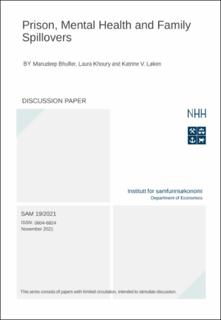| dc.contributor.author | Bhuller, Manudeep | |
| dc.contributor.author | Khoury, Laura | |
| dc.contributor.author | Løken, Katrine V. | |
| dc.date.accessioned | 2021-11-24T07:02:24Z | |
| dc.date.available | 2021-11-24T07:02:24Z | |
| dc.date.issued | 2021-11 | |
| dc.identifier.issn | 0804-6824 | |
| dc.identifier.uri | https://hdl.handle.net/11250/2831130 | |
| dc.description.abstract | Does prison cause mental health problems among inmates and their family members? Correlational evidence reveals that the prevalence of mental health problems is much higher among inmates than among the general population, but remains silent on the issue of causality. We exploit the strengths of the Norwegian setting and the richness of the data available to measure the impacts of incarceration on the health of defendants and their family members. We first use an event study design around the case decision event. We complement this with an instrumental variable strategy that takes advantage of the random assignment of criminal cases to judges differing in their stringency. Both methods consistently show that the positive correlation is misleading: incarceration in fact lowers the prevalence of mental health disorders among defendants as measured by mental health-related visits to health-care professionals. We further demonstrate that this effect lasts long after release and is unlikely driven by a shift in health-care demand holding health status constant. Family members, especially spouses, also experience positive spillovers on their mental health. | en_US |
| dc.language.iso | eng | en_US |
| dc.relation.ispartofseries | SAM DP;19/2021 | |
| dc.subject | mental health, incarceration, family spillovers | en_US |
| dc.title | Prison, Mental Health and Family Spillovers | en_US |
| dc.type | Working paper | en_US |
| dc.source.pagenumber | 54 | en_US |
| dc.relation.project | Norges Forskningsråd: 262675 | en_US |
